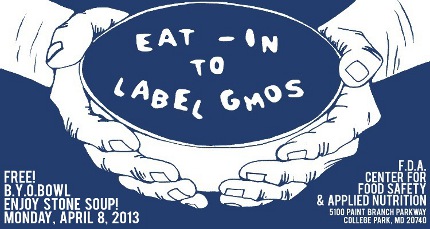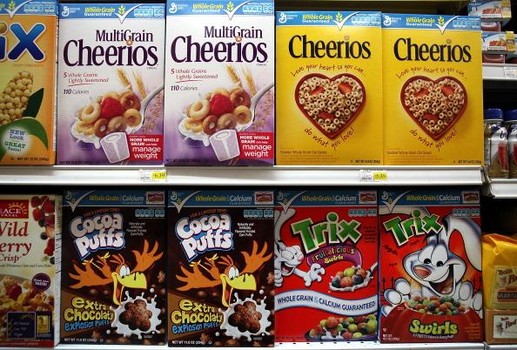Last week, I joined the first group call with the Massachusetts Right to Know GMOs organization for the labeling of genetically modified foods, and I’d like to take the opportunity to share with everyone the main issues discussed and how they may affect you.
It is estimated that about 80% of processed foods in the U.S. are already made with genetically modified organisms (GMOs), which means they have the genes from another species forced into their genetic code. The resulting genetically engineered DNA is an unstable combination of plant, animal, bacterial and viral genes that cannot occur in nature or by traditional breeding, and foods engineered in this way for our food supply are not currently required to be labelled as such.
Last week, congress passed section 735, a small provision now known as the “Monsanto Protection Act” seemingly “snuck in” attached to H.R. 933. The president has until today to sign it into law. This bill would allow the sale of GMO seeds even if a court has found them wrongfully approved and force the USDA to immediately approve permits for continued planting. Whether or not this particular bill becomes law today, there has been an attack on our food supply going largely unnoticed, but also many bills in the works aimed to check the biotech industry’s power and protect our right to know what is in our food.
The biotech industry that engineers GM foods has spent millions of dollars to prevent laws from being passed that would require them to label their products. Last year, in the campaign against California’s prop 37, they spent 47 million toward its defeat. They also don’t want outside testing to be performed on their products. When Monsanto seeds are purchased, they come with a contract stating no academic research on the seeds or resulting crops will be performed without their permission and review. There is not sufficient evidence that these foods are safe and more and more people are beginning to demand that they be properly labelled so we can make informed choices.
Genetically modified crops are engineered to be either herbicide-tolerant or pesticide-producing. This means, the crops can withstand large amounts of poison that kills the weeds, but this has led to the creation of resistant “superweeds”. Overall herbicide use in the U.S. on the main GMO crops, corn, cotton and soy, increased by 527 million pounds from 1996 to 2011. The other common type of genetic engineering causes the plant to produce pesticides on its own, so when a bug eats the plant, it destroys its stomach lining and kills it. 88% of corn in the U.S. is GM and 94% of all soy. The process of transferring genes creates mutations throughout the plant’s DNA that can increase its allergenicity and toxicity.
Right now, AquaBounty in Massachusetts is trying to get salmon approved for sale that is altered to produce continuous growth hormone and grow much faster and larger than natural (they also happen to have lower concentrations of healthy omega-3 fatty acids). In Florida, GM oranges are in field trials using genes transferred from frogs and moths. Apples that produce enzymes that keep them from turning brown are also awaiting federal approval, as well as crops modified to be resistant to another herbicide (“2,4-D”) because weeds are becoming resistant to the Bt herbicide crops.
So, things have been looking pretty grim, but at the same time the tides are changing. There is a promising ballot initiative in Washington State for GMO labeling, Peoples Initiative-522, “The People’s Right to Know Food Act”. If one state makes labeling mandatory, it could change everything, as food companies aren’t likely to label differently for different states, and it’s thought many would stop using GMO ingredients entirely if they are required to be labeled. 37 states now have various bills in play for labeling, including all of New England. Five bills involving GMO labeling have been introduced in Massachusetts for 2013 , four involving the labeling of GMO food, and one about GMO seeds.
Major grocers representing thousands of stores across the country have pulled together and pledged that they won’t wait for the FDA to approve the AquaBounty salmon, they won’t be buying. Whole Foods has pledged to eliminate all GMOs from their stores within the next five years, and Ben & Jerry’s and other companies are phasing them out as well. In order to succeed, consumers must tell companies using GMO ingredients that we are aware and we don’t want it in our food. Companies still using GMO ingredients include General Mills, Nestle, Ocean Spray, Kellogg, Nabisco, Frito Lay, Yoplait, Dannon, Smuckers, Kraft, Similac, and many more.
In the U.S., while we are fighting to get our food labelled and many aren’t even aware of the issues, 62 other nations have demanded GMO products be labelled or banned entirely.
Many people believe that the FDA performs studies on the products they approve. This is not the case. Corporations run their own studies and submit the results to the FDA for approval. Independent studies are never required on genetically modified foods, and no studies have been performed to assess the long-term effects of GMO consumption. The FDA only requires that GMO crops are tested for allergenicity.
It’s well-documented now that aspartame, an FDA-approved food product now owned by Monsanto, is poison. It was approved by the FDA with many submitted studies finding that it was safe, none of which were independently run. About every study since has found the opposite to be true. The bottom line is that we should have the right to know if we’re participating in a science experiment.
If you’re interested in learning more about the potential dangers of GMOs or in getting involved in getting GMOs labelled, there is a list of resources below. Genetic Roulette is an excellent movie to check out for more information. The following excerpt is just one example of the dangers these foods may pose and why people across the country are so passionate about getting them labeled.
Resources:
Food Democracy Now: Please sign to send a letter to congress to stop the “Monsanto Protection Act”
http://action.fooddemocracynow.org/sign/stop_the_monsanto_protection_act_seize_congress/
Institute for Responsibile Technology: Watch Genetic Roulette Online FREE
http://www.responsibletechnology.org/posts/genetic-roulette-free-screening-vote-today/
Five Labeling Bills Introduced in Massachusetts – Write your Rep!
http://marighttoknow.com/home/legislative-support/ma-legislation
H.R. 933: See section 735, AKA “Monsanto Protection Act”
http://www.govtrack.us/congress/bills/113/hr933/text
Just Label It!
www.justlabelit.org
The Non-GMO Project
www.nongmoproject.org
Center for Food Safety
www.centerforfoodsafety.org
Pledge for GMO-free Seafood
https://salsa.democracyinaction.org/o/455/p/dia/action/public/?action_KEY=12854&tag=webspot
The Rising Food Movement Continues the Fight for ‘Right to Know’ GMO Labeling
http://articles.mercola.com/sites/articles/archive/2013/03/05/gmo-labeling-fight-continues.aspx
How Common Is Genetically Altered Food? Go GMO Free and Find Out
http://www.rodale.com/genetically-modified-organisms-foods
Eat-In at the FDA for GMO labeling: On April 8, I’m joining with farmers, families and concerned citizens from across the country to participate in a picnic-style protest for the labeling of GMO foods in front of the FDA’s office in D.C. Everyone is bringing GMO-free ingredients to cook stone soup and/or GMO-free seeds to trade. A bus is picking up at a few locations around New England. Details are below if you’re able to join us or would like to donate any amount toward our bus funds.
https://fdn.actionkit.com/donate/eat-in-for-food-democracy


